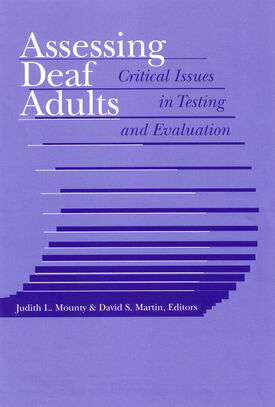
Assessing Deaf Adults
Critical Issues in Testing and Evaluation
Description
Historically, deaf and hard of hearing people have demonstrated various levels of competence in a multitude of professions, but they also have experienced discrimination and oppression. In five critical sections, this volume responds to the tidal wave of high-stakes testing that has come to dominate educational policy and qualification for various occupations. It provides a digest of relevant research to meet the testing challenge, including work done by educational researchers, legal experts, test developers, and others.
Section I frames the contexts facing deaf and hard of hearing individuals and those who test them, including a telling historical perspective. In Section II, chapters explore how deaf and hard of hearing candidates can meet the rigors of test-taking, how to level the playing field with a new approach to assessment, and what to consider to develop fully accessible licensing tests. The final chapter in this part examines the psychometric properties of intellectual assessments when used with deaf and hard of hearing people. Administrative Issues constitute Section III, beginning with legal considerations related to equity testing for deaf adults. An exploration of the potential of sign language interpretation in the testing environment follows.
Section IV provides case studies of deaf and hard of hearing adults from a variety of professions, including certification testing for therapeutic recreation, preparation strategies for university students, and ways to maximize access to licensure for social workers. A separate chapter addresses the impact of recent federal mandates on assessment of deaf and hard of hearing teachers and teaching candidates. The final section summarizes the current situation and presents recommendations to manage it, concluding with an epilogue on directions for the future.
Judith L. Mounty is Director of the Center for ASL Literacy at Gallaudet University, Washington, DC.
David S. Martin is Professor/Dean Emeritus in the Department of Education at Gallaudet University, Washington, DC.